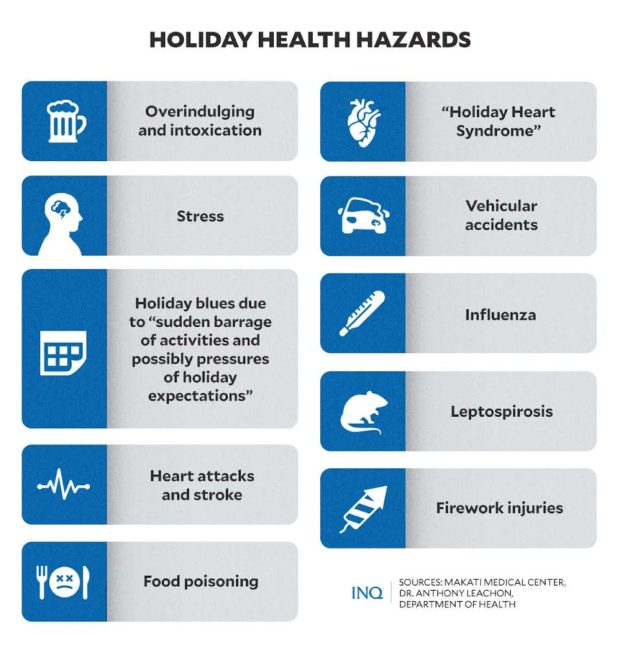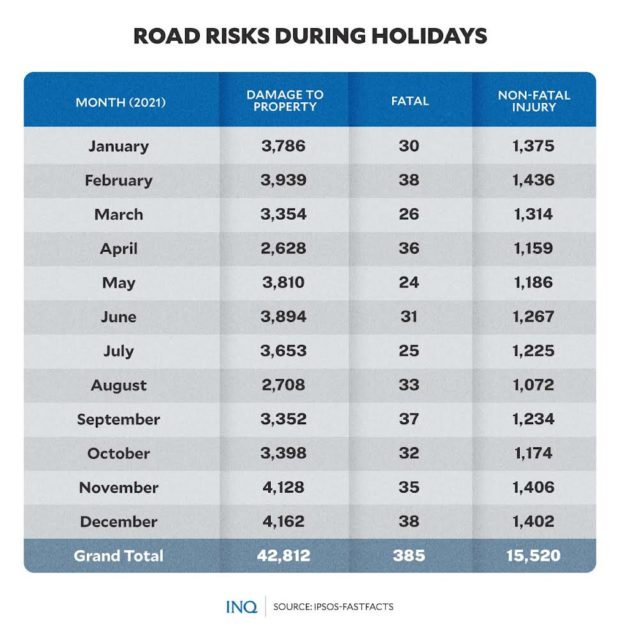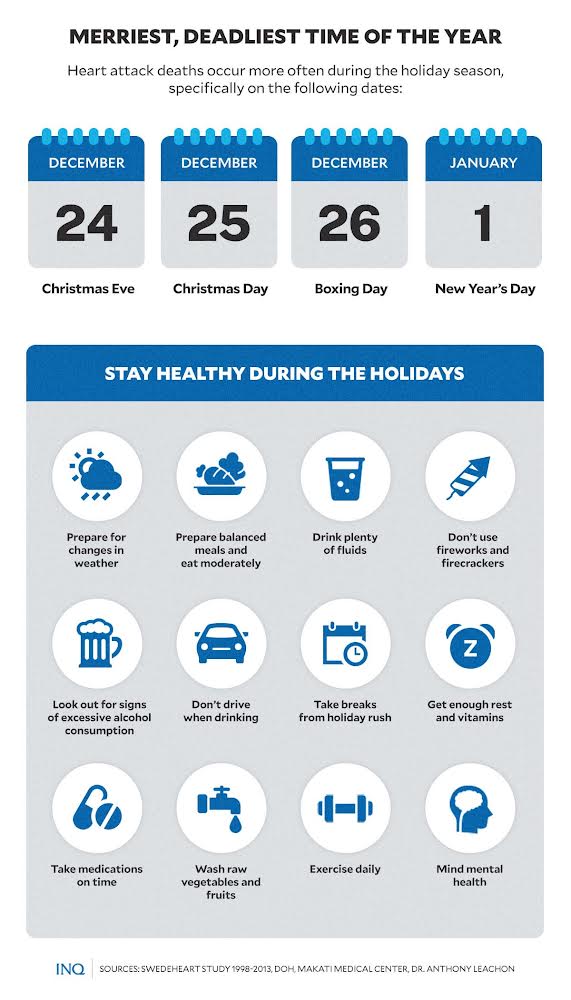Merriest yet deadliest: Knowing and preventing holiday hazards
MANILA, Philippines—As the country’s COVID restrictions slightly ease this year, the Filipino tradition of salu-salo, or gathering for the holiday seasons, is expected to return after years of lockdowns and quarantines.
However, while many consider Christmas and New Year as the “merriest time of the year,” health experts warn that these days are also the deadliest as people face health hazards increasingly during holiday celebrations.
Aside from common illnesses and diseases caused by holiday activities, medical experts also remind people to remain vigilant, responsible, and safe—especially amid the threats and risks of emerging COVID-19 variants.
‘Merriest yet deadliest’ time of the year
“December is the merriest time of the year, but also the deadliest time of the year,” health reform advocate Dr. Anthony Leachon told INQUIRER.net.
According to Leachon, the month of December until January has the highest incidence rate of cardiovascular disorders, like stroke and heart attack, globally.
A 2018 study published in the Journal of the American Heart Association (AHA) and the British Medical Journal (BMJ) found that more people die from heart attacks during the last week of December compared to any other time of the year.
The study said the days many Americans are most likely to die from cardiac arrest are:
December 25 (Christmas Day): most cardiac deaths occurred on this day than any other day of the year
December 26: second most cardiac deaths occur
January 1 (New Year’s Day): third most cardiac deaths occur.
Leachon noted that the cold weather contributes to cardiac deaths during the holiday season.
“The weather has something to do with [these deaths] because when the temperature is low, our arteries tend to get narrow. That’s when heart attack and stroke occur,” Leachon said in Filipino in one of his Youtube videos.
However, he said lifestyle choices during Christmas and New Year celebrations could also cause these cardiovascular problems—noting people’s tendency to overindulge during noche buena, a Christmas eve dinner tradition, or media noche, its New Year version.
“What happens [during the holidays] is people overindulge. They will then gain weight, have high sugar levels, high cholesterol, and high blood pressure,” said Leachon in Filipino.
“If a person is predisposed, [he or she] can suffer from a heart attack or stroke. These [incidencts] peak on December 25 because people will eat during noche buena,” he explained.
According to Makati Medical Center (MMC), overindulging, food poisoning, intoxication, and heart attacks are among the most common health-related hazards during the festive season.
READ: Food safety: How not to die or get sick while eating
“Eating almost always goes hand-in-hand with holiday festivities. While you fill up on the lechon, queso de bola, and countless desserts at every chance, your body is taking it all in with little to no rest. This can lead to complications like heartburn, acid reflux, headaches, and eventual weight gain,” MMC explained.
“The combination of holiday stress, unhealthy food, and lack of rest can lead to an increased risk of heart attacks. Studies have shown that heart attack incidents increase by a third during the holidays,” it added.
Common health hazards
Aside from cardiovascular problems, there are also other health-related hazards associated with the holiday season.
Earlier this month, the Department of Health (DOH) reminded Filipinos of possible and common illnesses during the festive season, like influenza, and leptospirosis.
“We have a trend of illnesses or a season of illness. Whenever the weather changes in the Philippines—dry then rainy or hot then cold —it is because ber months are already here, like this month of December. Incidents of flu rise, these are influenza, cases of pneumonia, or worsened flu,” said Health Undersecretary Maria Rosario Vergeire, DOH officer in charge.
READ: Take caution during season of illness – DOH
Although firework-related injuries have declined in the past years, Vergeire still cautioned the public, noting that accidents can still happen when using fireworks or firecrackers.
The health department recorded 30 firework-related injuries on the last day of 2021. These cases were 76 percent higher than in 2020, but were 66 percent lower than the five-year average of 89 cases from 2016 to 2020.
READ: DOH reports 30 fireworks-related injuries on last day of 2021
“When Christmas arrives, especially New Year, injuries rise in our country. We can help each other, whole of government, whole of society, so that we can prevent injuries stemming from using firecrackers,” said Vergeire.
Another common holiday illness, according to Leachon, is something called the “holiday heart syndrome.”
This happens when a healthy person with no history of heart disease suddenly experiences irregular heart beats and eventually collapses. It is also known as “alcohol-induced atrial arrythmias” or an irregular heartbeat caused by high alcohol intake.
MMC listed “holiday blues” among the common health risks during Christmas and New Year celebrations.
“While the holidays are meant to be a cheerful time, the sudden barrage of activities and possibly the pressures of holiday expectations—like giving gifts, preparing meals, and inviting relatives—can cause what is known as ‘holiday blues’,” it said.
“This is usually characterized by feeling more tired than usual, lingering sadness, and having difficulty concentrating.”
Drunk driving, road accidents
Intoxication, or too much alcohol intake, does not only cause heart problems, it could also lead to road accidents and deaths.
According to the Metropolitan Manila Development Authority’s (MMDA) 2021 road crash statistics, the highest number of vehicular accidents in Metro Manila was recorded during the month of December, with a total of 58,447.
Out of those, 42,812 resulted in damage to property, 385 were fatal, while 15,520 were non-fatal.
While MMDA’s data did not identify whether these cases recorded in December were all due to drunken driving, data from the Land Transportation Office Law Enforcement Services (LTO-LES) showed that the number of road accidents related to intoxicated driving increased this year.
From January to December 2021, the LTO-LES responded to 73 road accidents. Of these, 68 drivers tested positive for alcoholic intoxication.
This year, from January to October, the number of road accidents and drunk drivers involved in crashes rose to 546 and 489, respectively.
In an interview over GMA’s 24 Oras, LTO Law Enforcement and Adjudication Service Deputy Director Roberto Valera explained that these cases could be linked to speeding.
“Usually when a person is drunk, they have less control to (sic) their body. So there’s really a tendency to be involved in road crash accidents. Their reflexes are reduced,” he said in mixed Filipino and English.
The LTO said it will strictly implement RA10856, or the Anti-Drug Driving Act, this holiday season.
Holiday COVID spike
According to Vergeire, there was a 222 percent increase in new COVID cases as of Jan. 2, 2022 compared to those recorded from Dec. 6-9, 2021 and Dec. 20, 2021.
While the cases were described as moderate, the daily virus attack rate was 1.07 for every 100,000 individuals.
READ: 2022 COVID surge, med shortage see mirror image from 2020
With the holiday season approaching, Vergeire said she does not expect a resurgence in COVID-19 infections despite the presence of more immune-evasive Omicron sub-variants and in-person gatherings during the holidays—amid the country’s relaxed mask mandate this year.
At a recent press briefing, Vergeire said there would be no significant increase in the number of cases by the end of December “as long as the public knows how to protect themselves [against COVID-19].”
“We think that the increase in cases would not be felt as much,” she added.
READ: DOH: No COVID-19 surge despite strains, holidays
At a separate media forum, the health undersecretary said up to 2,200 daily COVID-19 cases could be recorded this holiday season should minimum public health standards are not heeded.
“We have a projection that by the end of December, we might have a daily average case of 2,200 cases should we lower the implementation or compliance of minimum public health standards. Meanwhile, the lowest, we can have as low as 429 cases if we continue to uphold the proper, minimum public health standards,” said Vergeire.
READ: DOH: 2,200 daily COVID-19 cases possible during Christmas season
Stay healthy during holidays
To prevent COVID infection this holiday season, Leachon advised the public to strictly heed minimum public health standards at all times, noting that the SARS-CoV-2—the virus that causes COVID-19—is airborne.
“Those who have co-morbid conditions have higher risks of contracting COVID. If this happens, we might [see] a double pandemic during the holiday season,” Leachon cautioned.
“The best advice I could share the public is to wear your masks, boost up, and try to improve your immune status by adherence to the lifestyle changes,” he added.
He also told the public, “please be calm and don’t panic,” as COVID-19 cases this holiday season might be mild cases. Still, he reminded the public to get vaccinated while doses targeting new COVID variants are being awaited.
To avoid common holiday health hazards, Leachon gave this set of advices:
- Reduce or stop smoking
- Avoid fatty food
- Exercise
- Know your body mass index and try to keep it at a normal level
- Reduce or stop alcohol intake
- Mind mental health
- Take medications on time
- Get enough sleep (at least 7 to 8 hours per day).
“We don’t want to be hospitalized during the most important time of the year. Health is wealth. Even during Christmas, don’t lose your guard […] be fit and be healthy and stay happy,” he said.
- To have a healthy holiday season, the DOH likewise reminded the public to:
- Take care of each family member against possible changes in temperature which could cause cough, colds, and fever for both children and adults.
- Prepare well-balanced noche buena and media noche meals—which include vegetables and fruits alongside the traditional ham and queso de bola.
- Be kind to your hearts and eat a moderate amount of nutritious food.
- Drink plenty of liquids like water and fruit juices.
- Have enough rest and sleep to avoid stress and exhaustion.
- Don’t use fireworks and firecrackers.
TSB
For more news about the novel coronavirus click here.
What you need to know about Coronavirus.
For more information on COVID-19, call the DOH Hotline: (02) 86517800 local 1149/1150.
The Inquirer Foundation supports our healthcare frontliners and is still accepting cash donations to be deposited at Banco de Oro (BDO) current account #007960018860 or donate through PayMaya using this link.



